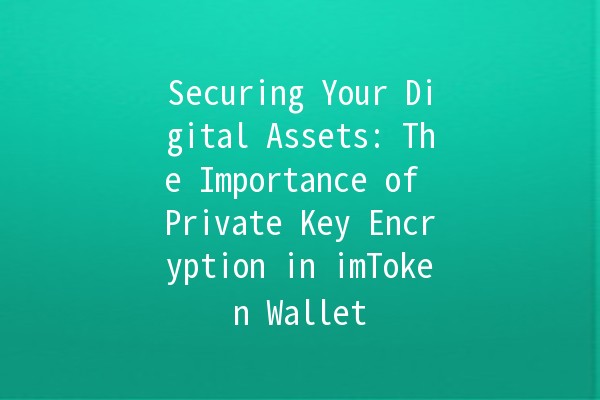In the rapidly evolving landscape of cryptocurrency, the importance of securing digital assets cannot be overstated. One of the most crucial aspects of this security is the management of private keys. The imToken wallet is a popular choice among cryptocurrency users due to its userfriendly interface and robust security features. This article delves into the methods of private key encryption storage within the imToken wallet, offering readers practical advice, insights, and productivityenhancing techniques that ensure their assets are wellprotected.
Private keys are cryptographic keys that secure and grant access to digital assets stored within a cryptocurrency wallet. Essentially, they are the ultimate password for your crypto holdings. A compromised private key means that anyone can access your funds, making it imperative to understand how to securely manage them.
When it comes to imToken wallet, the application not only simplifies the management of these keys but also provides excellent security features that users should leverage.
One effective way to secure access to your imToken wallet and, subsequently, your private keys is through biometric authentication. This method utilizes unique biological characteristics, such as fingerprints or facial recognition, making it significantly harder for unauthorized users to access your wallet.
Practical Application:

Ensure that you activate biometric authentication in the imToken wallet settings. This can be done under "Security Settings" where you can enable either fingerprint or facial recognition.
Review and update your biometric settings periodically to ensure they function correctly.
In addition to biometric security, maintaining a strong, unique password for your imToken wallet is fundamental. A robust password can significantly reduce the chances of unauthorized access.
Practical Application:
Create a password that is at least 12 characters long and includes a mix of uppercase letters, lowercase letters, numbers, and special characters.
Use password managers to generate and securely store complex passwords. Make sure your password manager is also secured with strong authentication methods.
An oftenoverlooked aspect of private key management is the importance of regular backups. Backing up your private keys ensures that you can restore access to your wallet in case of device loss, theft, or any unexpected issues.
Practical Application:
Use the imToken wallet's backup feature to create a secure and offline backup of your seed phrase. This seed phrase can be used to restore your wallet across different devices.
Store your backup in a secure physical location, such as a safe or a secure deposit box. Avoid cloud storage unless it is highly encrypted.
TwoFactor Authentication adds an extra layer of security to your imToken wallet. Even if someone manages to obtain your password, they would still need the second factor to access your wallet.
Practical Application:
Enable 2FA within your imToken wallet settings. You can choose to receive verification codes through SMS or use an authenticator app.
Regularly review authorized devices and remove any that are no longer in use.
Regular updates to the imToken wallet are critical in ensuring that you have the latest security features and patches to protect your private keys.
Practical Application:
Enable automatic updates for the imToken wallet if possible. This ensures you are notified when a new version is available.
Regularly check the official imToken website and trusted sources for any news regarding vulnerabilities or updates.
In addition to the productivityenhancing techniques mentioned above, imToken also provides a variety of builtin security features that users can leverage.
imToken supports multiple blockchains and associated tokens, allowing for diversified asset management under one roof. This means users can execute transactions securely within various crypto environments without needing multiple wallets.
With integrated decentralized applications (DApps), imToken users can interact with decentralized finance (DeFi) platforms while ensuring their private keys remain secure. Always ensure that any DApp interaction is conducted through official channels.
If you suspect that your private key has been compromised, immediately transfer your assets to a new wallet with a new private key. Use the recovery option with your backup phrase to reset your wallet. Additionally, enhance your security by following the tips provided above.
You should back up your private keys whenever you make significant changes to your wallet (like adding new tokens) or if you change your device. Regularly auditing your backup every few months can also be beneficial.
If you lose your private key and do not have a backup of your seed phrase, recovery may be impossible. This highlights the importance of maintaining secure backups.
Never share your private key with anyone. No legitimate entity, including customer support, would ask for your private key. Sharing it compromises your security and puts your assets at risk.
Yes, hardware wallets are known for their enhanced security features as they store your private keys offline. For users with significant crypto assets, a hardware wallet can be an excellent addition to their security strategy.
Using public WiFi can expose your data to potential interception. If you must use public networks, it's critical to employ a VPN and ensure your wallet apps have security features enabled.
Managing your private keys securely within the imToken wallet is vital to protecting your digital assets. By employing strong passwords, enabling biometric authentication, utilizing twofactor authentication, regularly backing up your keys, and keeping your software updated, you can enhance the security of your wallet significantly. Remember, in the realm of cryptocurrency, your security practices are your first line of defense against potential threats.
Stay educated about security practices, implement the recommendations outlined, and keep your assets safe in this increasingly digital world.👇